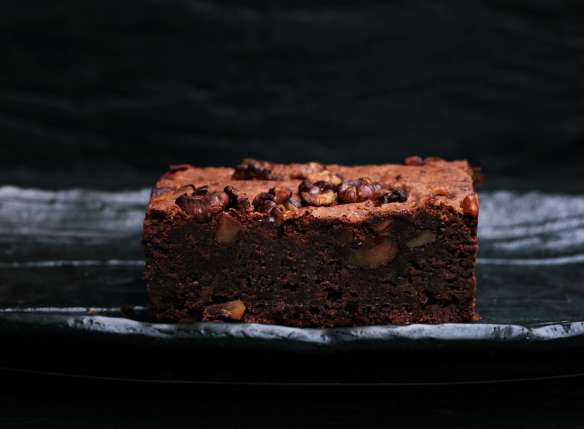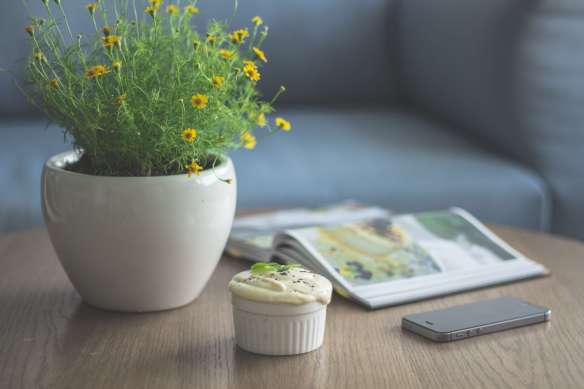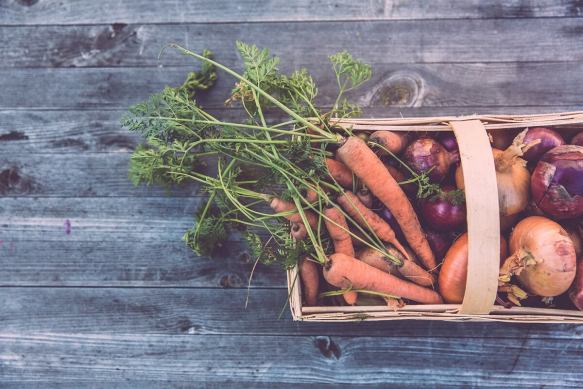 Photo credit: Toa Heftiba
Photo credit: Toa Heftiba
In my new semi-regular blog series on modern living, I’m taking a look at lifestyle trends — like fashion, make-up and eating — and exploring some of the issues related to our modern ways of living.
The other day, I was flipping through a magazine and spied something that made me roll my eyes: a ‘clean eating’ version of a chocolate brownie recipe. The recipe instructed to include baobab powder in the brownie mix: a so-called ‘superfruit’ powder formed inside the fruit of the African baobab tree.
I’ll be the first to say: I like eating good-quality food. I notice the difference in how my body feels and my skin looks when I eat well — minimal amounts of processed sugar; meals with plenty of veg; grains (rice and couscous are store cupboard staples), beans and pulses. And sometimes, yes, I do buy into the popular trend of baking with unrefined sugars and gluten-free ingredients, simply because some of those recipes are actually quite delicious.
But these trends for unusual ingredients make me sigh because it’s clearly something that’s driven by fashion. The ingredients are often expensive and impractical, something for people who have the money to shell out on a niche ingredient that they’re only likely to use in one recipe. Eating acai and goji berries sounds a lot more Instagram-worthy than tucking into a bowlful of good, old-fashioned strawberries. But locally grown produce, organic if possible, can be a ‘superfood’ too.

Photo credit: Tran Mau Tri Tam
Ironically, considering the trend is all about promoting wellness, it has given rise to a new type of eating disorder: orthorexia, an obsession with so-called ‘clean eating’. The deluge of lifestyle blogs, often written by attractively slim young women, may offer a tempting image — ‘eat what I say, and your life can look like mine too’.
But few of them are trained nutritionists, and imposing strict rules on what’s ‘clean’ and what’s not can be an unhealthy pursuit. As Hadley Freeman, writing in The Guardian says, “They’re right: what we eat is important, which is why it’s important people with qualifications beyond an Instagram account educate us about it”.
This craze has another impact which isn’t widely acknowledged: the impact on the environment. Many healthy eating advocates recommend eating a diet which is low in meat, fish and dairy products (or cutting some of them out altogether). Doing that has a hugely positive impact on our world, helping to reduce overfishing, inhumane factory-farming and greenhouse gases.
 Photo credit: Markus Spiske
Photo credit: Markus Spiske
But many of the fancy ingredients touted by lifestyle bloggers are exotic and they aren’t always ethical. Crack open any ‘clean eating’ recipe book and you’re guaranteed to find coconut oil on the ingredients list. Coconut oil is a versatile ingredient which can be used as a moisturizer, hair conditioner, and for cooking and baking.
However, the high demand for it is leading to deforestation in some countries as mangrove swamps — areas with high biodiversity and wildlife habitats — are removed to make way for coconut plantations. And baobab powder may have great nutritional benefits, but you can bet your bottom dollar that shipping it all the way from Africa will leave an elephant-sized carbon footprint.
Really, when it comes to healthy eating, you can’t go far wrong with the old adage: everything in moderation. In the wise words of Michael Pollan, “Eat food. Not too much. Mostly plants”.
What do you think about the clean eating trend? Do you think it gives healthy eating (moderation, simple food, seasonal produce, not too much sugar or salt) a bad name?

I’ve wondered a lot about this. It’s a peculiar modern issue that eating healthy has become something for the relatively privileged. Previously eating somewhat badly or overindulging (or indeed eating at all) was what set the stable/wealth apart, these days it’s eating trendy. It’s odd to me how much harder it seems to get “natural” food in the modern urban environment. It takes intention and effort for most while processed food is absolutely everywhere you look.
Something very cliche happened to me in my late 20s and when I turned 30: I began noticing how food really affects me for the first time. Hands down the biggest impact is from sugar. I inadvertently cut way back on my sugar consumption for a couple of weeks a year or two ago and when I resumed more “typical” eating habits, I felt almost immediately awful as a result. I’ve tried to cut back more purposefully since (though my approach hasn’t been as scientific or methodical as it probably could be) and my weight, skin health, and overall wellbeing respond whenever I’m diligent about it.
I’m not sure if clean eating is the answer (as your post makes very clear, that seems to be a highly subjective term), but I’m wary of the ethics of modern diets all around. Whether it’s deforestation of rare fruits and plants, or ill treatment of livestock and game, or the price of healthy food in poorer areas, it does feel unnecessarily hard for a variety of people to eat well, sustainably, and seasonally. Add in new mental health impacts, it’s minefield.
LikeLiked by 1 person
It certainly isn’t hard to find processed food! And it’s advertised everywhere you look.
I notice a big difference when I cut back from sugar too. I still eat sugar (I’m not giving up dark chocolate!) but I prefer more unrefined sugar. Sickly sweet things with a high volume of processed sugars (high-fructose corn syrup, glucose-fructose syrup etc.) don’t make me feel good.
I feel like some aspects of the clean eating trend are spreading the wrong message. It’s possible to eat well without it costing the earth (literally and figuratively). When I’m looking for low-cost nutritious recipe ideas, my go-to book is Hugh Fearnley-Whittingstall’s “River Cottage Veg Every Day”. So good!
Thanks for your lovely, thoughtful comment. I hope you’re having a great weekend. 🙂
LikeLike
I think the clean eating trend has gone too far. It has instilled so much fear in people, and it’s just wild! I am in the same boat as you–I like to eat real, good quality food, but I’m not one to buy expensive ingredients just because they’re deemed “super foods.”
LikeLiked by 2 people
Definitely! This trend seems to be a cause of unnecessary worry for some people. I think food should be a source of joy, not stress. I love eating good food — I’ve got pumpkin muffins baking in the oven right now. 😊
LikeLiked by 1 person
Yum!
LikeLike
This is a great post. It’s so important to be reminded that our lives don’t need to look like a fitness magazine. I posted something along similar lines recently if you’d like to check it out!
You’ve definitely got a new fan.
LikeLiked by 1 person
Thank you! I’m glad you enjoyed the post. 🙂
LikeLike
I think you can eat a healthy diet and as you say “in moderation” from products that are grown locally. You not only are helping yourself but the local farmers and merchants as well.
LikeLike
I agree. It’s great to support local producers, and food that hasn’t been flown a few thousand miles tastes better too. 🙂
LikeLiked by 1 person
This is hands down, an amazing post. Do you mind if I share it on my Instagram account,
LikeLiked by 1 person
The part about the coconut oil is really interesting. I’m part of that dad and I had never thought about the effects it’s having on our environment
LikeLiked by 1 person
Thank you! Yes, of course – feel free to share links. 🙂
LikeLike
Great article, I’ve written something on the topic this week from the perspective of a Food Science & Nutrition University student. Thought you might like to take a look?
LikeLiked by 1 person
Thank you. I’ll check out your post! 🙂
LikeLike
Clean eating can send a dirty message. https://placeatthetable.net/2017/02/09/clean-eating-sends-a-dirty-message/
LikeLike